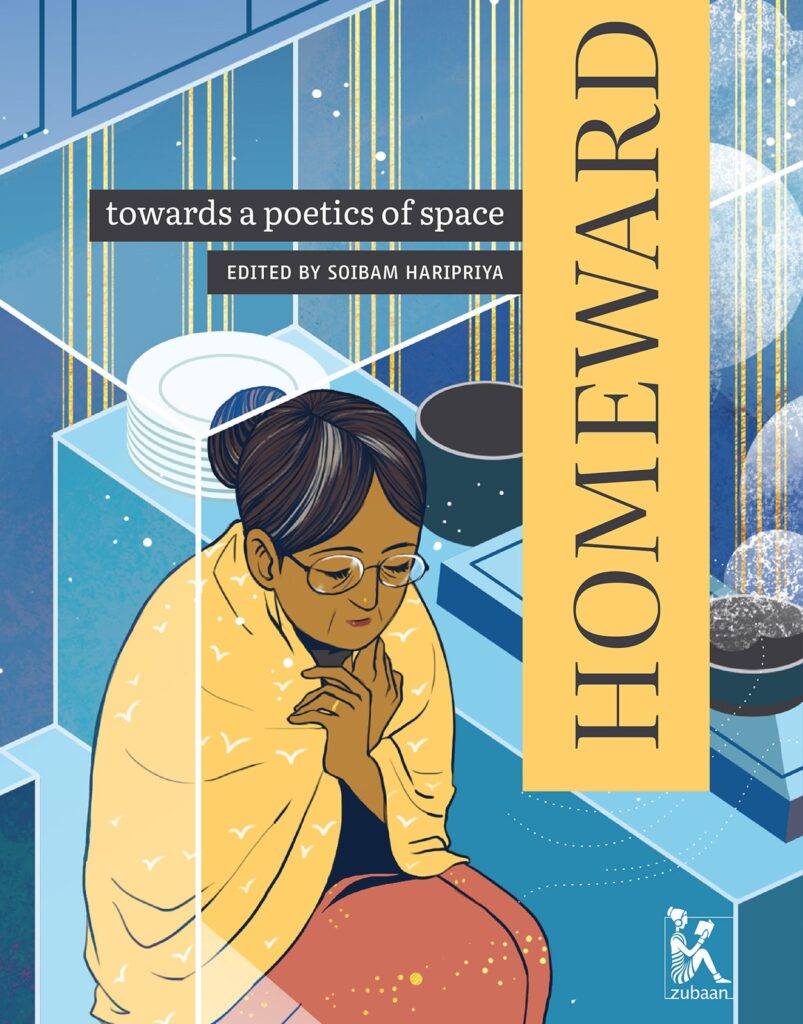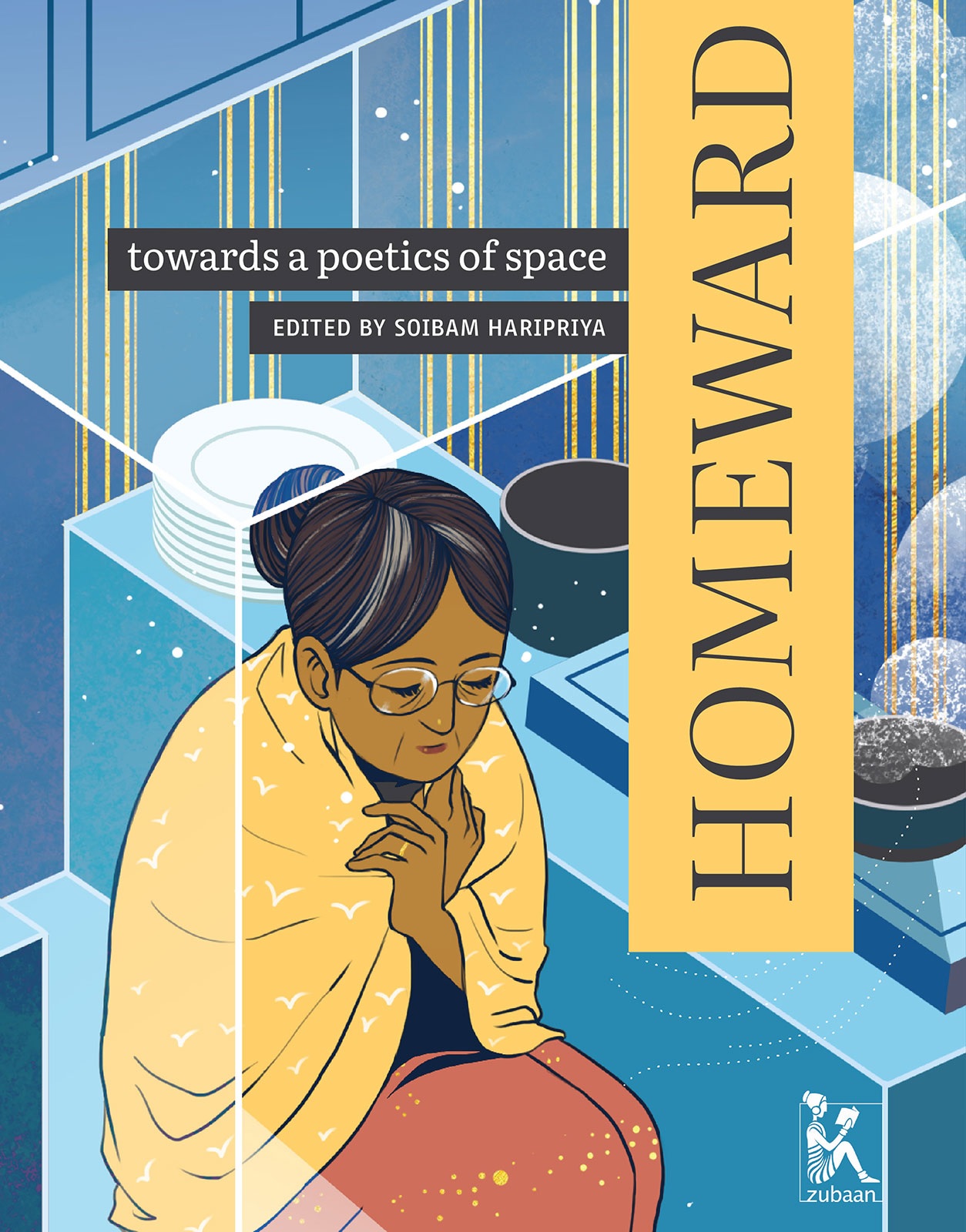
Homewards: Towards a Politics of Space is an anthology of short stories, poems, personal essays and art (digital and hand art), compiled and edited by Soibam Haripriya and published by Zubaan Books in 2022. Homeward houses the work of twenty-two diverse authors and artists. The contributors include scholars, researchers, activists, journalists, and illustrators, most of whom belong to states relegated as the “Northeast” of India. It also includes two works of writers from Myanmar.
In initiating a discussion on the idea of ‘home’, Haripriya clarifies that the effort is to move beyond the heteronormative conception of home as a consequence of marriage, existing only among biologically or matrimonially related people. She writes,
“Home could be a students’ commune that houses transient residents; a barsati on a terrace on a hot summer noon humidified by desert coolers; a riverine island eroding each monsoon or a street with no name. It is a mosaic of non-addresses or a collection of temporary addresses. It could have its dusk skies lit with the shelling of homes or maintain its fragile ceasefire peace.”
But to broaden its scope is not to evade a proper definition, but rather to clarify ‘home’ as a phenomenon, a structure, an experience and a feeling. Home then is not automatically ascribed but created through the process of movement, political interaction, class aspiration, and identity formation. And the process of such creation is never complete, it is dynamic. It passes on through invisible channels, and morphs from one generation to the next, as each grapples with its material and non-material aspects. By compiling contributors from the different states of the Northeast, Haripriya offers an array of perspectives, refusing to dilute the diversity that exists within the region.
Conceptualising home in this manner necessarily requires one to meditate upon identity. In the context of the nation-state, the eight Northeastern states are often relegated to the periphery. Further, people from Northeastern states who work, study or are born within mainland India are perceived as the racialized other. A certain ‘un-Indianness’ is assumed by markers such as physical features or accents, irrespective of whether the Northeastern person feels this way. Thus what Homeward does more than anything else, is to put forth Northeastern narratives, written by Northeastern voices.
Leki Thungon’s autobiographical account ‘Back Home’ traces her journey growing up between Assam and New Delhi, it explores a lineage that can not be boxed into one state or area, and the shock mainlanders display at her fluent command over English and Hindi.
Amorette Grace Lyngwa’s ‘Angela’ talks of negotiating mainland cities, liberation and asphyxiation experienced in these spaces. The underlying sense of un-belonging felt both in Shillong, where she was born and finished high school; and Bangalore, where she attended college and now works. She writes :
“I haven’t really been back home in the last six years. I mean, I’ve gone on and off, but you know, it’s strange. I haven’t really gone gone. I don’t think it’s possible anymore for me. I don’t know where it is anymore really. Between these two cities and their swooping claim on my heart, their difficult, difficult histories with my affection, and how they pull me into being two separate parts of myself, inside out-outside in, I’m lost.”
Soibam Haripriya’s poems ‘Diabetic Aunt’ and ‘Coming of Age’ point to regional peculiarities of the prevalence of diabetes in Manipur and the phenomenon of co-wives. Vishü Rita Krocha’s ‘A Grandmother’s Tale’ provides a reminiscent account of her grandmother’s home by combining folklore and storytelling,
A common thread running through many works is the feeling of being on the threshold of an interchangeable ‘here’ and ‘there’. While some authors provide reminiscent accounts of an idyllic ‘home’ away from here, most situate themselves in a constant state of liminality between ‘here’ and ‘there’. Or more simply put, while home exists ‘here’ and ‘there’, home is also neither ‘here’ nor ‘there’. Both these statements ring equally true, even as they conflict, they exist in a dialectical motion with one another.
I believe Homewards’ most impactful articulation is that of gender and race. Multiple stories by women contributors present how sexism and racism interact in metropolitan cities to cause terrifying and dehumanising violence. The hypersexualisation of Northeastern female bodies, and the internalised racism of mainland men who believe they have the right to objectify, exploit and ‘take from’ Northeastern women is the most precise articulation I have encountered in Indian literature, which rarely, if ever, discusses this.
It is deeply anthropological, in that it gives primacy to lived experiences framed through writing and art. It is also political, it does not shy away from the unromanticized reality of ethnic and communal conflict, among and within each state; or state-sanctioned violence. Rubani Yumkhaibam’s essay ‘Home, Identity and Love: Reflections on Belonging’ while providing her personal experience as a Pangal Muslim growing up in Manipur, is a powerful historical and political commentary on the Meitie-Pangal conflict. It brings forth ideas of othering, patriarchy, rootedness and identity creation. It substantiates with excerpts from her primary research and data from historical archives, all while remaining engaging to the average reader. She writes :
“The idea of home is often very susceptible to romanticization. We invoke the memories of a dream time when humanity lived in close alliance with the beauty of nature. We imagine a mythical motherland. However, when the imagination becomes a political act our desires and habits lose their anchor in love and humility.”
Similarly, Vishü Rita Krocha’s work recalls the brutality inflicted on the Naga population by the Indian Armed forces; and the violence and disruption normal people had to endure because of militant activities.
Thus, with its diverse contributors, styles of writing and art, Homeward has something for everyone. It is enlightening and impactful because experiences when retold as stories have a far greater hold on the reader than any perfectly cited, data-heavy research paper. Most contributions are engrossing and push the reader to engage in a critical reflection of their positions and biases.
***
Yana Azad is pursuing an MA in Sociology from Jawaharlal Nehru University (JNU).

Iam very impressed Yana! You go girl!
regards
Bhumija